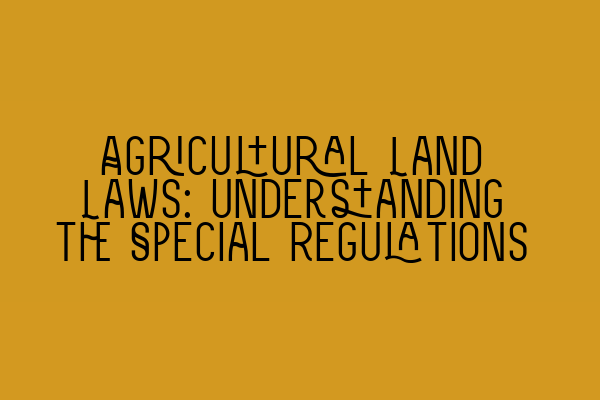**Agricultural Land Laws: Understanding the Special Regulations**
As a property law solicitor, it is crucial to have a comprehensive understanding of the various regulations that govern different types of land. One area that requires careful consideration is agricultural land, which is subject to special regulations due to its unique characteristics and importance in the agricultural sector. In this blog post, we will delve into the intricacies of agricultural land laws, exploring the special regulations that apply and providing valuable insights for property law practitioners.
**Defining Agricultural Land**
First and foremost, it is important to establish what constitutes agricultural land. Agricultural land refers to land that is primarily used for agricultural purposes, such as crop cultivation or livestock rearing. It plays a vital role in food production and preservation, as well as sustaining rural economies.
**Special Regulations for Agricultural Land**
There are several special regulations that apply specifically to agricultural land, designed to protect the agricultural industry and encourage sustainable land use. Let’s explore these regulations in more detail:
1. **Planning Permission Restrictions**: When it comes to agricultural land, planning permission restrictions can be more lenient compared to other types of land. This is because farmers require flexibility in managing their land for crop rotation, livestock grazing, and other agricultural practices. However, it is still important to ensure compliance with relevant planning regulations, especially when diversifying land use or undertaking extensive modifications.
2. **Environmental Regulations**: Agricultural land is subject to strict environmental regulations to protect natural resources and biodiversity. Farmers must adhere to rules regarding pesticide use, land drainage, water pollution prevention, and environmental conservation. These regulations aim to strike a balance between agricultural productivity and environmental sustainability.
3. **Agricultural Holdings Act 1986**: The Agricultural Holdings Act 1986 provides legal protection for tenants of agricultural land, ensuring their security of tenure and regulating rent increases. This legislation plays a vital role in safeguarding the interests of farmers and supporting the long-term productivity of agricultural land.
4. **Common Agricultural Policy (CAP)**: Although the United Kingdom has now left the European Union, understanding the Common Agricultural Policy is still essential for property law practitioners. CAP governed the allocation of agricultural subsidies and influenced land use regulations. As the UK transitions away from CAP, it is important to stay updated on the new agricultural policies and subsidy schemes.
5. **Rural Development Programmes**: Rural development programmes often provide financial support and incentives for sustainable agricultural practices, land conservation, and rural regeneration. These programs aim to enhance the economic, social, and environmental sustainability of agricultural land, creating thriving rural communities.
Understanding these special regulations is crucial for property law practitioners dealing with agricultural land. Compliance with the law helps maintain the integrity of the agricultural sector while ensuring the rights and responsibilities of landowners and tenants are respected.
**Key Considerations for Property Law Practitioners**
When advising clients on agricultural land matters, property law practitioners must consider several key factors. Here are some important considerations:
1. **Due Diligence**: Conducting thorough due diligence is essential to uncover any potential issues or restrictions pertaining to agricultural land. This includes investigating planning permissions, environmental compliance, tenancy agreements, and any relevant grant schemes or subsidies.
2. **Land Use Flexibility**: Agricultural land may have potential for diversified use, such as renewable energy projects, tourism ventures, or agribusiness development. Understanding the opportunities and constraints associated with such ventures enables property law practitioners to provide comprehensive advice to their clients.
3. **Collaborative Agreements**: Property law practitioners should also be well-versed in drafting and negotiating collaborative agreements, such as farm business tenancy agreements, share farming agreements, or joint venture agreements. These agreements often involve complex legal and financial considerations, and specialist expertise is required to create effective and fair arrangements.
In conclusion, agricultural land is subject to special regulations aimed at preserving its agricultural productivity, protecting the environment, and supporting rural communities. Property law practitioners must have a thorough understanding of these regulations to provide effective advice to their clients within the agricultural sector. By staying updated on the latest developments and continuously expanding their knowledge, property law solicitors can navigate the complexities of agricultural land laws and ensure the best outcomes for their clients.
For more information on the SQE exams and preparation, check out these related articles:
– [SQE 1 Practice Exam Questions](https://fqps.co.uk/sqe/sqe1-preparation/mcq-practice-quiz)
– [SQE 1 Practice Mocks FLK1 FLK2](https://fqps.co.uk/sqe/sqe1-preparation/practice-mocks-quiz)
– [SQE 2 Preparation Courses](https://fqps.co.uk/sqe/sqe2-preparation)
– [SQE 1 Preparation Courses](https://fqps.co.uk/sqe/sqe1-preparation)
– [SRA SQE Exam Dates](https://fqps.co.uk/sqe/sqe1-sqe2-exam-dates)
